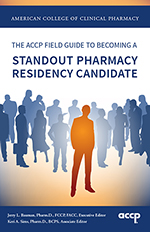
If you are a pharmacy student who has made the all-important decision to seek a position as a pharmacy resident, you will want to read The ACCP Field Guide to Becoming a Standout Pharmacy Residency Candidate. ACCP has prepared a comprehensive handbook to guide you in positioning yourself above the crowd of residency program applicants, enabling you to stand out as an exceptional candidate. Using a step-by-step approach that covers your entire pharmacy student career, leaders in clinical pharmacy have written the Field Guide expressly to help you establish yourself as an ideal residency candidate.
Of growing importance early in your academic career is taking the initiative to begin maximizing your curricular and extracurricular experiences so that you are prepared to be a standout candidate, especially as more pharmacy students seek postgraduate pharmacy training. ACCP’s Field Guide offers concrete information on how best to enhance your chances of securing a residency position. Included are clear, concise, and practical suggestions for charting your course toward a successful postgraduate experience.
Steps outlined in the Field Guide include the following.
Step I: Define and Redefine Your Goals. This chapter is intended to initiate a process toward making your career dreams a reality. Setting goals and planning for a future career in clinical pharmacy are important and necessary skills to hone. More critical is your need to be able to modify your goals and academic course as you progress through pharmacy school. This chapter will also outline how you can research residency programs early in your educational experience and determine the type of program that might best align with your individual career goals.
Step II: Make the Grade. Academic achievement is important for every pharmacy residency candidate. This chapter will lend perspective, helping you develop the skills you need to succeed in the classroom and assisting you in your pursuit of a lifetime of learning and professional development.
Step III: Get Involved. This chapter will assist you in exploring and pursuing the many opportunities to get involved in professional and community activities. Moreover, you will gain the tools needed for self-reflection so that you may fully realize the impact of your experiences.
Step IV: Develop Leadership and Management Abilities. When selecting a resident, pharmacy preceptors and program directors look for candidates who possess an aptitude for leadership and management. This chapter will provide guidance on time and project management as well as the development of your leadership skills.
Step V: Gain Valuable Work Experience. Students need to plan their internships and identify additional shadowing and work opportunities to benefit their professional development. This chapter will guide that planning process and prepare you to put forth the best possible application and interview to secure a valuable work experience.
Step VI: Maximize Experiential Education. Introductory and advanced practice experiences are designed to enhance learning and move the student beyond classroom-based instruction and simulation. This chapter will shed light on how you as a student pharmacist can use these opportunities to develop a deeper understanding of clinical practice, a capacity for critical thinking, and the ability to apply clinical skills as your clinical pharmacy career begins.
Step VII: Expand Your Network. Invaluable in any profession is the ability to develop and maintain a broad and effective professional network. This chapter will guide you in the early phases of building a professional network that you will benefit from throughout your career.
Step VIII: Engage in Research and Scholarship. ASHP-accredited residency programs require residents to complete a research project. Residency candidates who have previously participated in research and other scholarly activities during their student career will have an advantage over other applicants. The purpose of this chapter is to prepare you to get involved in scholarly activity early and to develop the research and presentation skills that residency program directors seek in residency candidates.
Step IX: Document It All. A well-written curriculum vitae (CV) creates a positive image and distinguishes a residency candidate from the rest of the crowd. This chapter will provide tips and tools to help you effectively market your skills and experience through CV writing and portfolio development.
Step X: Step Up to the Plate: Bringing It Home in Your Final Professional Year. This chapter will provide students with an overview of the many processes in the fourth professional year that are necessary to obtain a residency position, including preparing for and attending the ASHP Midyear Clinical Meeting, understanding the Residency Showcase and Personnel Placement Service, completing residency applications and interviews, writing a cover letter and/or letter of intent, and understanding the match and scramble process.
Purchase your copy of The ACCP Field Guide to Becoming a Standout Pharmacy Residency Candidate now to ensure you make the most of your academic career opportunities and establish yourself as the best-prepared candidate for postgraduate pharmacy training.